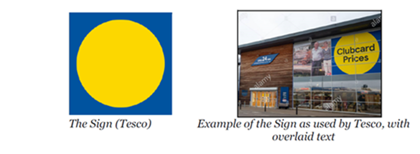

LEGAL COMMENT: Battle of the supermarkets: from price wars to trade mark disputes
Lidl v Tesco
After three-years of litigation and over £2 million in legal costs, the High Court has found that Tesco’s Clubcard Prices logo was copied from Lidl’s yellow and blue branded logo.
In 2020, Lidl issued a claim against Tesco for infringement of its registered trade mark logo devices, passing off and infringement of copyright. Tesco counterclaimed, alleging that some of Lidl’s trade marks in issue should be declared invalid on the grounds of bad faith and/or for non-use.
The trade marks in issue: -


Following a four-day trial in February (2023) the judge, (Mrs Justice Joanna Smith), determined that she was satisfied that the average consumer perceiving these signs as a whole would regard them as similar and agreed that Tesco’s Clubcard Prices logo resulted in a “subtle but insidious” transfer of image from Lidl’s logo in the minds of some consumers.
In this regard, the judge was influenced by Lidl’s evidence as to what the majority of people would think, which included spontaneous unprompted comments on Twitter and reactions from members of the public to Tesco’s Clubcard Prices logo at the time of its launch, as well as evidence that individuals within Tesco’s own Insight Team acknowledged the potential for “misattribution” prior to the Clubcard Prices logo being launched.
In the judge’s view “There (was) clear evidence of both origin and price match confusion/association together with evidence that Tesco appreciated the potential for confusion.”
The judge did, however, find that Lidl had been unable to displace the first impression inference raised by Tesco in its counterclaim that, at the time of the 1995 application, the Wordless Mark was registered in order to use it as a weapon to secure a wider legal monopoly than it was entitled to, with no genuine intention to use it, and therefore was sufficient to amount to bad faith and render the 1995 Wordless Mark invalid.
Whilst Tesco intends to appeal the High Court ruling it is anticipated that Tesco may now redesign and create a new logo for its Clubcard Prices branding sooner rather than later.
Weightmans’ partner Dominic Green commented:
“Whilst each case turns on its own facts, (and this one certainly did), this case is a sharp reminder of the importance and value of branding and reputation management in the retail sector, and indeed elsewhere”.
Weightmans’ Principal Associate Conrad McDonald said:
“Discount supermarkets have historically come under fire for their “lookalike” own-brand products, but it is evident that, especially in current times of high inflation and the cost-of-living crisis, they will not hesitate to take the fight to more established supermarkets who they consider might now be trying to capitalise and ride on the coat tails of their discount rivals. As the supermarket price wars and competition intensify, so too might intellectual property disputes in the grocery market sector.”
More articles by Dominic Green






